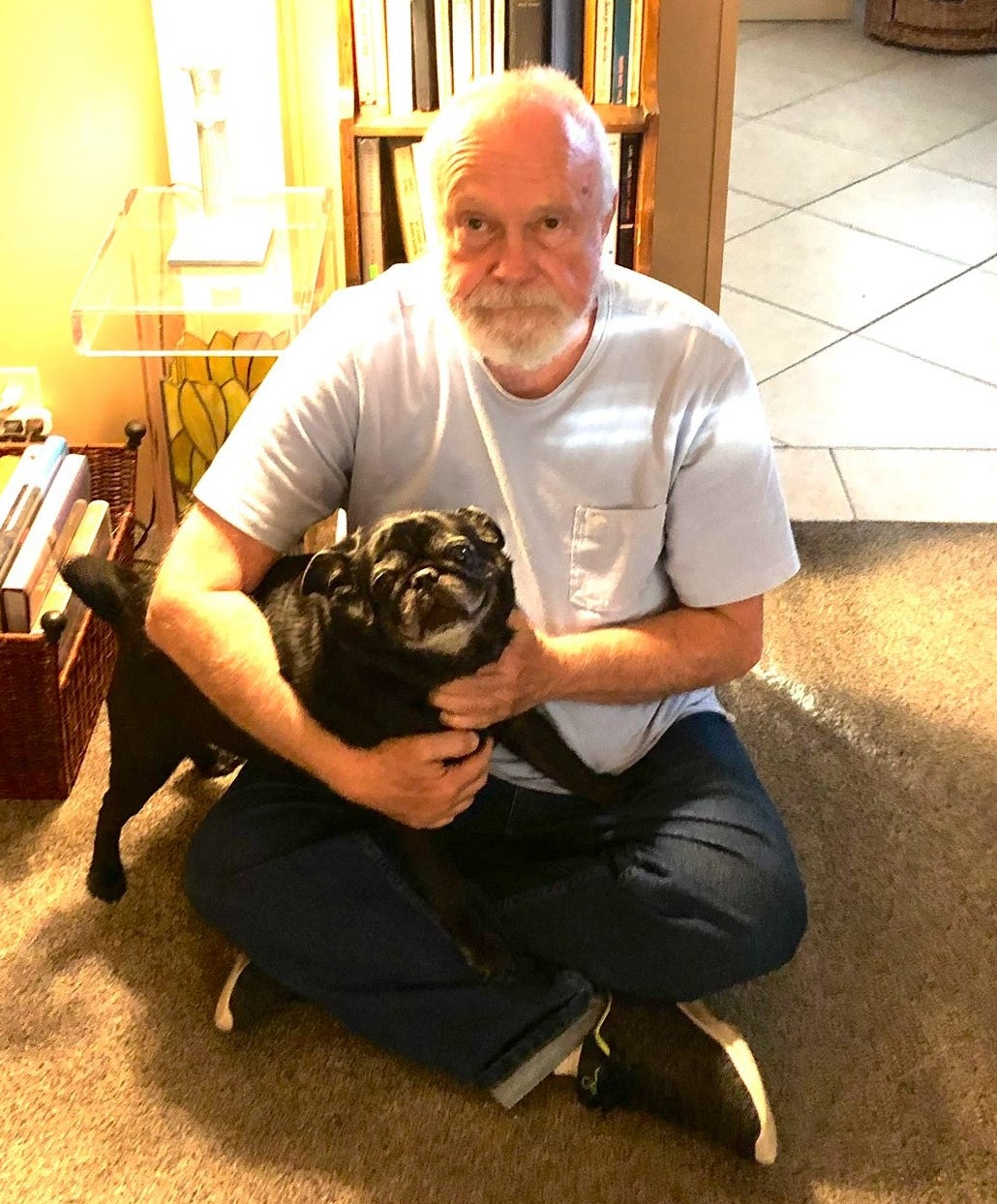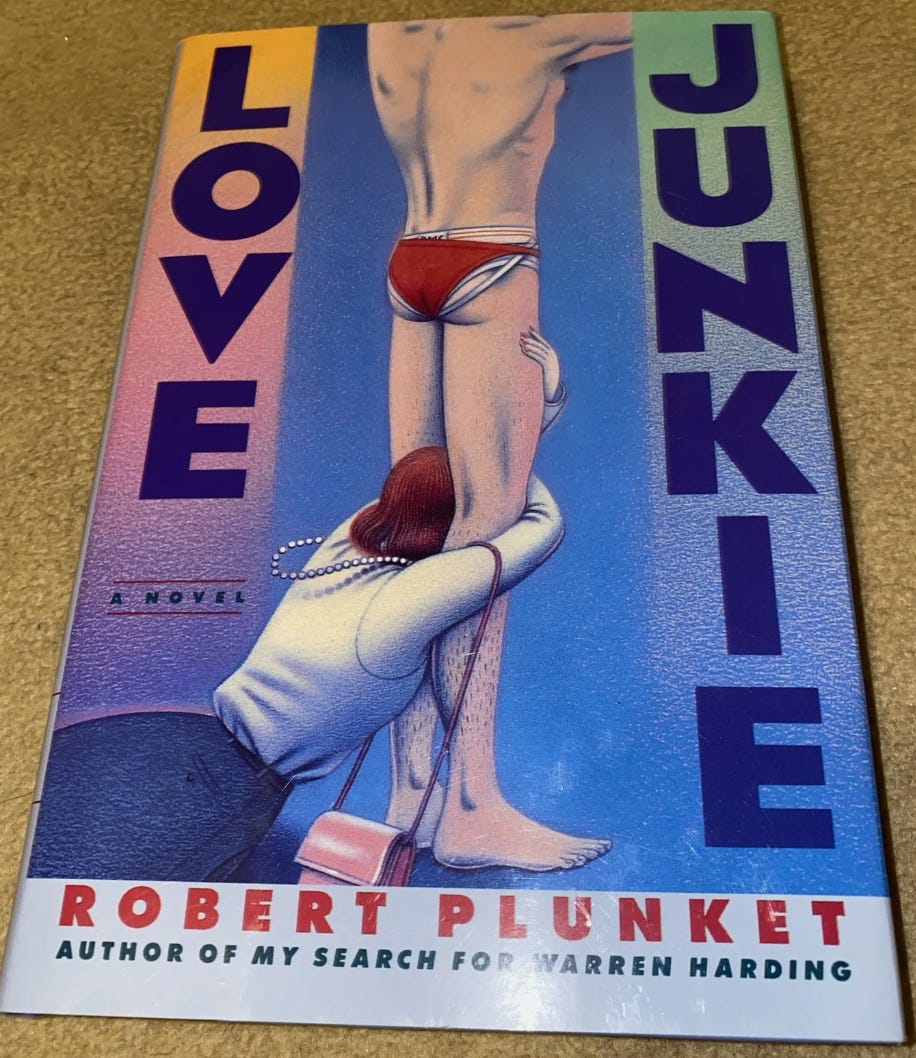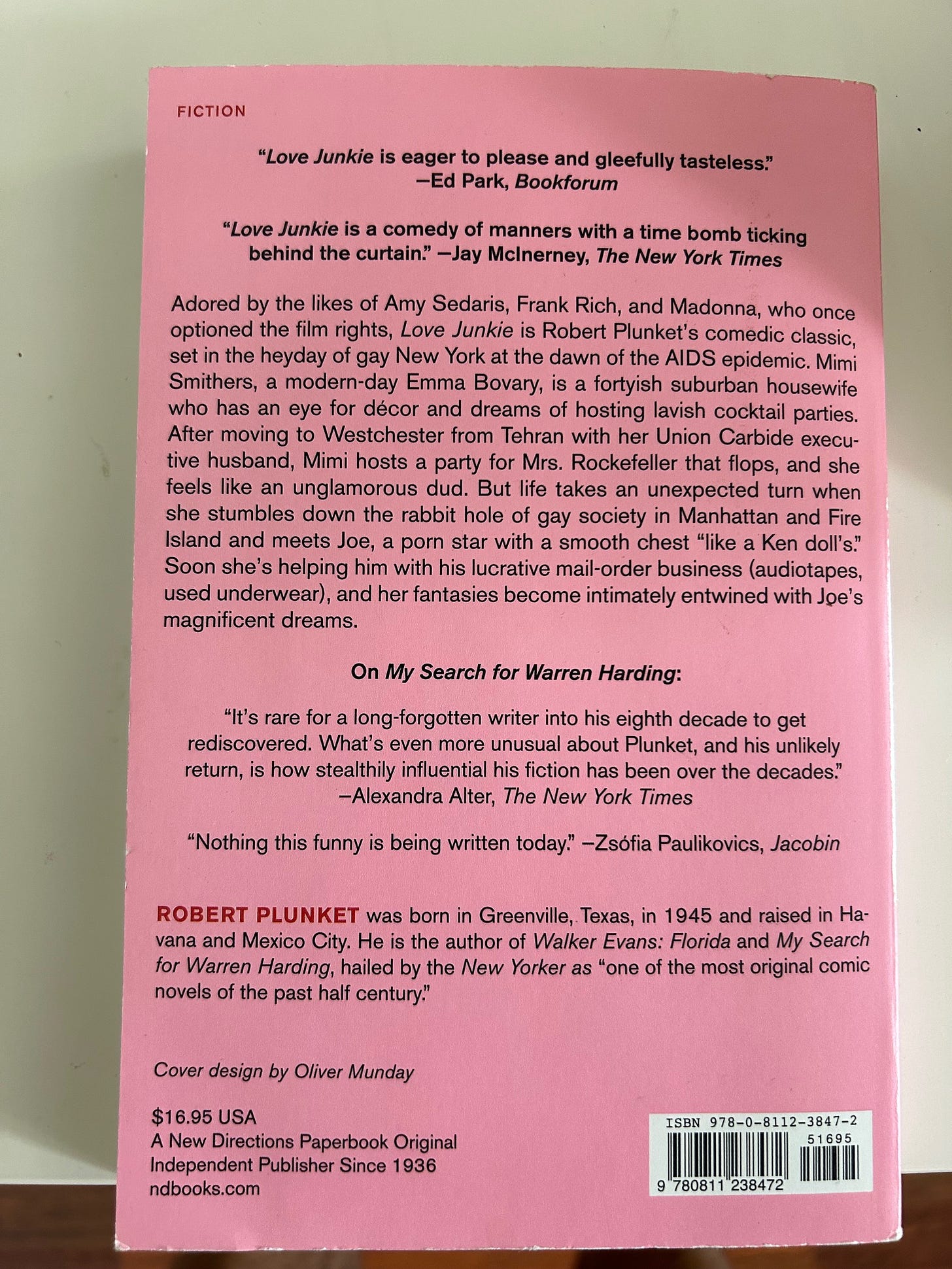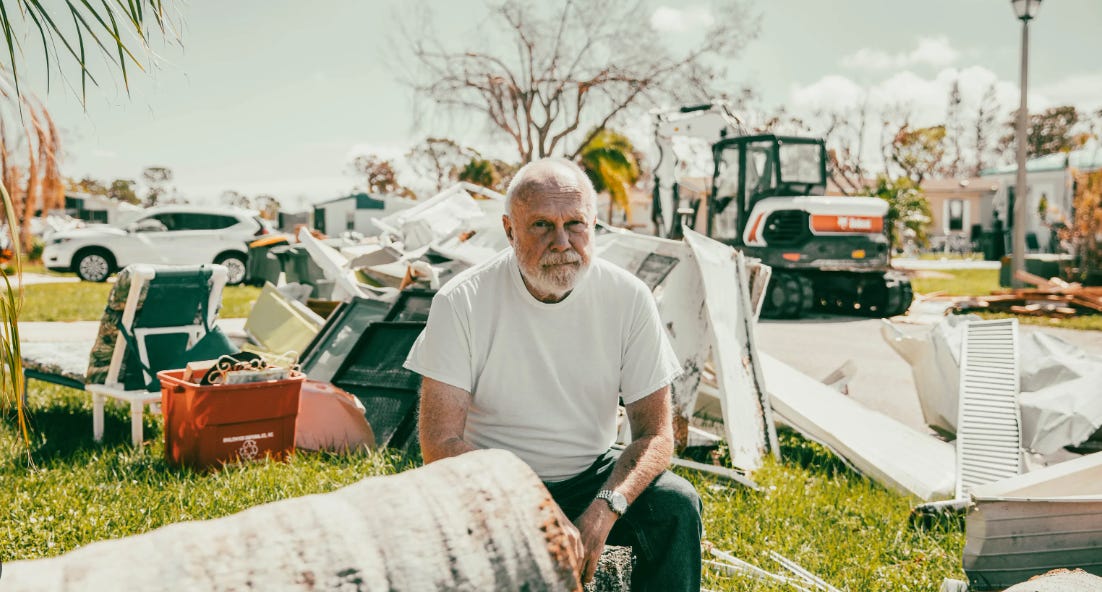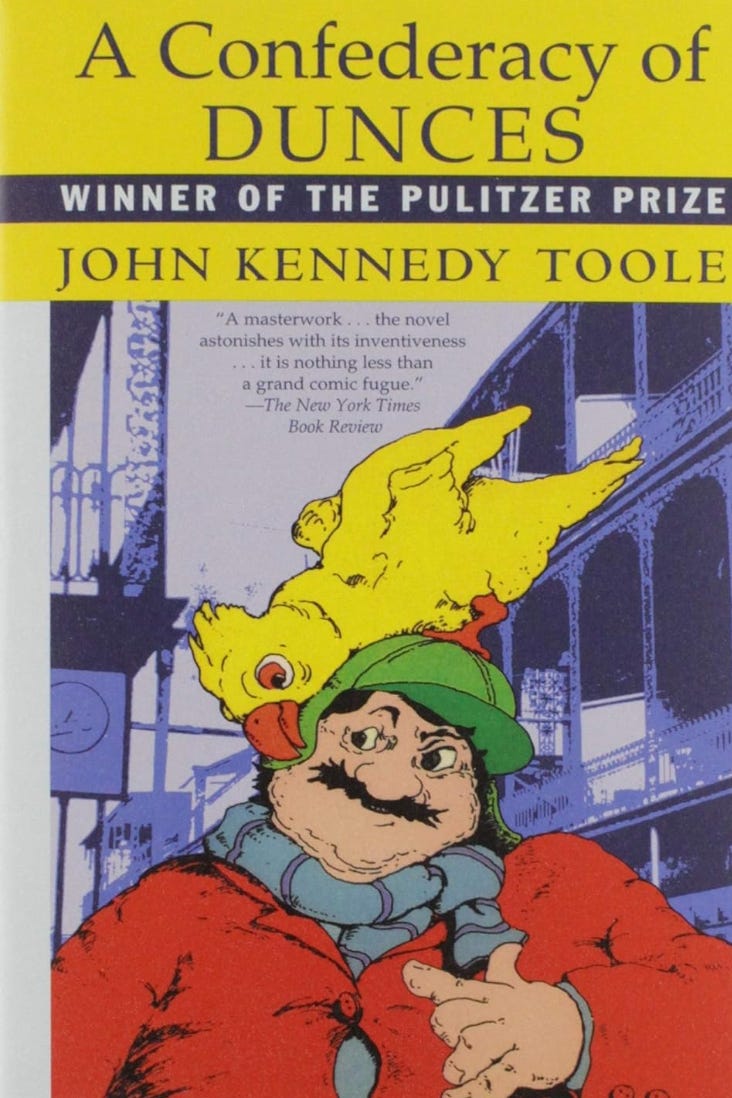Robert Plunket's Comeback After Writing The Funniest, Gayest Novel of All Time
His 1992 black comedy "Love Junkie" was film-optioned by Madonna before he faded into relative obscurity. Then came last year's much-lauded reissue. Now 76, he's thoroughly enjoying his rediscovery.
Happy late July, Caftaners! Let’s start by talking about the presidential election (which literally, as I started writing this, took a shocking turn with Joe Biden’s dropping out and Kamala Harris’ taking his place).
In fact, let’s not. Haha! Let’s let this month’s August Caftan be an oasis from all things November 2024. Instead, let me start with a request, which is that, for a project I’m working on, I’m looking for gay folks (men or women) who were in San Francisco in the mid-late 1970s. If that’s you or anyone you know, would you reach out to me at timmurphynycwriter@gmail.com with the subject line “1970s San Fran”? In addition to this project I’m working on, these might make great Caftan convos, too.
I’m super-excited about sharing this Caftan interview. Let me set it up this way: A few months ago, I was browsing a local bookstore (It’s Topos here in my Brooklyn/Queens-straddling neighborhood) and came across this novel:
The title and author name rang a vague bell, and as I leafed through it, I had a strange déja vu feeling of having read it before, right out of college in the very early 1990s when I was working in book publishing. I sent this photo to my good college friend from that time, Gill, when we were always reading the same books, and asked if it rang a bell, and she said that it absolutely did, except that she thought it had a different cover at the time. Which, in fact, it did:
And then I remembered how wildly funny we’d thought it was. So I bought the book and took it home and proceeded to crack up over it all over again, 32 years after it was published, and perhaps more so, because I know the Manhattan gay milieu of the early 1980s, the book’s setting, so much better than I did then. And rather than reinventing the wheel by describing what it’s about, I’ll just let the back cover do the work:
Does that give you an idea of how gonzo this book is? The two comparisons that come to mind are A Confederacy of Dunces and, well, John Waters films, probably most likely Serial Mom. It is also, as the cover copy notes, a hilariously specific look at upscale Manhattan gay life in the late 1970s and early 1980s, and is not without its own notes of ominous AIDS foreboding.
Who the hell was this Robert Plunket again? A little Googling revealed that, with the recent republication of both Love Junkie (1992)—which was optioned by Madonna for a film that never got made—and his first novel, My Search for Warren Harding (1983) by New Directions, Plunket, who is now 79 and lives in what he assured me is a semi-exclusive trailer park in Florida, has had a literary comeback after 32 years of almost complete obscurity, with adoring write-ups in The New York Times, New York magazine’s Vulture and The Paris Review, among other places. In the mid-1980s, after trying to make it as an actor in both NYC and L.A.—he has a small role as a nerdy gay guy in the 1985 cult movie After Hours—he’d decamped to Florida, where he ended up becoming the gossip columnist for Sarasota Magazine and not publishing another novel after Love Junkie.
But then, during Covid, the writer Danzy Senna was lent an old copy of Warren Harding by her writer friend Victoria Patterson and loved it so much that she showed it to New Directions, which loved it so much that it reissued both WH and Love Junkie. And that is how Plunket’s literary comeback started. And when I saw that Plunket had sat for his author photo in front of what looks like a pile of literal trailer trash…
…I knew I just had to interview this man. So I reached out and that’s just what we did for about 2.5 hours on July 15. “I consider us friends now,” Robert said at the end of the interview, and by that point, I did, too. I’d just fallen in love with him. He was funny, but not as surgically, scathingly funny as he is in his books, which I think shows that he knows craft, which is one of the reasons why I love these two novels so much—because Plunket loves novels and thinks a lot, as I do, about how to build them well. He was, in fact, rather sweet and earnest. And again, as a non-rich, non-famous writer myself, how can I not love a man who wrote two brilliantly satirical comic novels (which, as critics have noted, were very much before their time in terms of a kind of people-at-their-worst humor that drove the success of Seinfeld and Curb Your Enthusiasm), then labored quietly as a freelance writer for years (he still does), then enjoyed a late-in-life comeback through no efforts of his own but because another writer with some pull discovered and fell in love with his work? You can’t resist a story like that.
As I told Robert, I liked Warren Harding, whose delightfully insufferable male narrator, one Eliot Weiner, is closeted, but I *love* Love Junkie. It’s the kind of novel that only a gay man with a gimlet eye for every detail of aspirational Manhattan pre-AIDS gay life could write, and it’s driven by a narrator, Mimi Smithers, who is kind of like Emma Bovary as imagined by John Waters. Please please please buy and read it! And cross your fingers for new work from Robert, which he says is forthcoming.
As always, I’ll ask that, if you’re a free Caftan subscriber and you consistently like the parts of my interviews I put before the paywall, please consider subscribing for $5 a month. The more paid subscribers I have, the more time I can devote to Caftan.
So here’s my chat with the slyly brilliant Robert Plunket (which, I should note, includes photos from Robert’s private collection of certain gorgeous porn stars/hustlers he knew or dated in his NYC days).
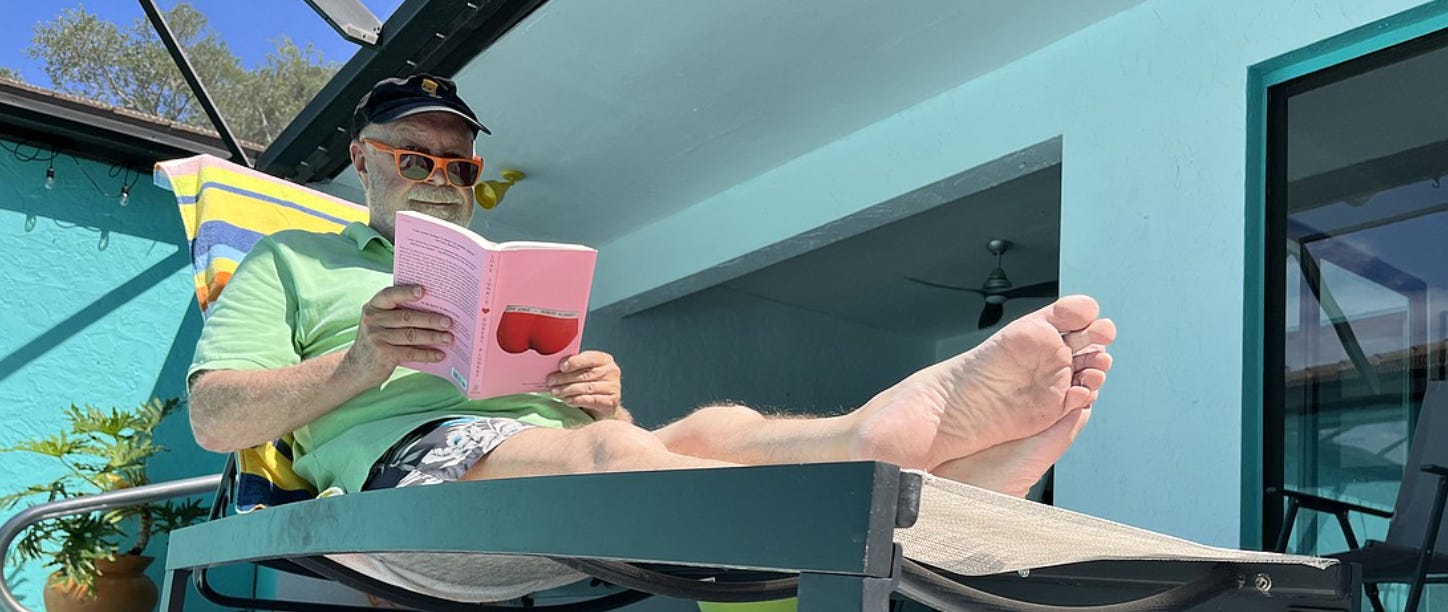
Tim: Robert, I’m so excited to talk to you about your work and your life. Can you start by describing a typical day?
Robert: I live in a trailer park northeast of Sarasota. I’ve been there a little over a year. I just to live in a similar place but Hurricane Ian destroyed my trailer there and I had to get another one.
Tim: What is the new community like? Is it socially conservative?
Robert: Oh, yes.
Tim: Trump flags?
Robert: No, this one is a little too sophisticated for that kind of thing.
Tim: Oh, it’s like an upscale trailer park?
Robert: Oh, it’s very upscale. There’s a clubhouse, two swimming pools, a lot of activities. For most people here, it’s a winter home. It’s not poor by any stretch of the imagination.
Tim: Do your neighbors know you’re gay?
Robert: That’s a very good question. I feel like I’m very incognito. They have no idea about my backstory. They’re not readers and they don’t read stuff like The New York Times.
Tim: So you’re living below the radar among them?
Robert: Yes, exactly, I’m in hiding.
Tim: Do you have any friends there?
Robert: Oh yeah, the neighbors are wonderful, very nice people. I have a whole different opinion of elderly conservative white people from the midwest now.
Tim: Maybe they wouldn’t care that you were gay.
Robert: It’s never come up. Personally, I always—what am I trying to say? I guess I do my best to hide it because I’m not interesting in getting into that argument with anybody.
Tim: And you have a dog, too?
Robert: Yes, Meatball. He’s an eight and a half year old pug. He’s having some problems I’m worried about. He’s starting to pee on my leg and that’s not good. He’s on a lot of meds and sometimes that sets him off with weird behavior. I’m sitting on the fence about taking him to the vet. Every time I take him it’s $300 to $400 and that’s a problem, so I’m hoping it’ll go away.
Tim: Me too. So what is a typical day like?
Robert: Well, I live with somebody.
Tim: A lover?
Robert: No. [long pause] It’s very hard for me to get into all that, so let’s talk around it for the time being.
Tim: Okay.
Robert: So I get up around eight and jump out of bed and take the dog out for a 15-minute walk.
Tim: It must be sweltering in Florida right now.
Robert: Yeah, it’s been incredibly hot this summer.
Tim: Do you barely leave the house?
Robert: No. I’ve been in Florida 40 years now and I don’t go out more than I have to, but the heat doesn’t bother me. Okay, so the Mysterious Person I’m talking about goes to Dunkin’ Donuts to bring me iced coffee, which I drink while I read The New York Times and The Washington Post and watch the local news. I don’t eat in the morning. Then it’s time for Let’s Make A Deal and then The Price Is Right. [we both laugh] Then I usually go to my room and work.
Tim: Meaning write?
Robert: Yes. I’m working on so many interesting things, so I’m busy.
Tim: Are you working on a novel?
Robert Well, a novel I wrote a long time ago, around 2005, is going to be published by New Directions. It’s a very bizarre book and when I wrote it, everyone said, “What is this? I don’t get it. This is stupid and silly.” But for some reason, everything I do starts to make sense years later. Anyway, it’s a novel but it’s in the form of a coffeetable book that is the memoirs of an interior decorator.
Tim: [laughs] Who did the illustrations?
Robert: I hired a guy and there’s photography, too.
Tim: Okay, so you’ve been working on rewrites?
Robert: Yes, and I love rewriting in general. It’s not tedious.
Tim: That’s so interesting, I kind of think of it as like cracking open a Fabergé egg you’ve made that you don’t want to break and then figuring how to put it together better. And once I’m into it, I can enjoy it, but it’s tough to start. Why do you love rewriting?
Robert: I love to look at a paragraph I’ve written and figure out how to make it better. I’m very conscious of pacing and rhythm. You want to always be propelling a book forward, and every sentence makes the book do that.
Tim: Are you a fan of A Confederacy of Dunces?
Robert: I used to get asked that a lot and I must confess I’ve never read it. I have no idea what it’s like or if or how it’s similar to my work.
Tim: Do you want to read it?
Robert: No. I only read things that can be useful to me for some reason or other, and I don’t feel that that book would be. How come this guy [the author, John Kennedy Toole] got all the acclaim and I didn’t? That’s a door I don’t want to open.
Tim: Okay, I understand that. So how long do you work for per day?
Robert: Not that long. I’m almost 80 years old—gimme a break! Until about 1pm. Then I go to the gas station for lunch. They have a 7-11 that has delicious tamales. There’s a tremendous amount of new construction where I live and most of the construction workers are Mexican, so there is a tremendous amount of good food from Mexico, which is where I grew up, so I love Mexican food and being around Mexican people. They have a little table at the 7-11 where I eat. Then I go shopping in my car, a beautiful new Kia. I usually go to the Goodwill store. There are five of them around here, so if you want to make a day of it, you can go to the farther-out ones. I’m always looking for stuff —and it’s paying off! My trailer is going to be photographed and featured in a fancy European decorating magazine. That’s the dream of every faggot.
Tim: [laughing] Is it stuffed with tchotchkes?
Robert: I have them, but it’s not crammed—it’s very beautifully laid out. Then I come home and sometimes I’ll do a little more work late in the afternoon, but usually I get tired because I’m old. So then I go to the Publix and bring home dinner. For the Mysterious Person, I get a sub or food from the hot bar with Chinese food. For myself, it entirely depends. At the moment, they have delicious watermelon salads. Or I’ll have an apple.
Tim: That’s it for dinner?
Robert: Yeah. I never turn on my stove. But I still can’t lose weight. So then we eat our dinner over Lester Holt on the 6:30 news. Then we watch Wheel of Fortune and Jeopardy. But I’m getting a little disappointed with Jeopardy.
Tim: Why? Jeopardy is the best game show.
Robert: I want to see new people every day and I don’t understand the theory behind the Tournament of Champions. Some of them I don’t like and some I find a little disturbing. Anyway, I’ve also started watching TMZ. I think it’s incredibly important because that’s how I keep with all these new celebrities.
Tim: Any in particular?
Robert: I can’t say there’s one that’s sticking out at the moment.
Tim: Like Taylor Swift or Beyonce or Meghan Markle?
Robert: I don’t consider Meghan Markle a celebrity. I consider her a goddess.
Tim: You love her.
Robert: I love her and I hate her and I think she’s foolish and brilliant. She’s not playing her cards right. She lucked into this incredible situation with this hot guy and she’s not doing it as well as she should.
Tim: You think they should’ve stayed in England as part of the family?
Robert: I can see how that family— [pause] In my decorator’s memoir, the central gimmick is that the decorator works for the Duchess of Windsor. So I know that an American woman with a lot of strong ideas that joins that family—it never works out right, which I find fascinating. I totally understand what poor Meghan is going through. What they did to her in the UK is so racist and so anti-woman.
Tim: Okay, and so after TMZ?
Robert: I go back to work until 12:30 or 1am.
Tim: How long has the Mysterious Person been living with you?
Robert: Twenty-two years.
Tim: Oh, wow. But he’s not someone you talk about as a partner publicly?
Robert: No, because he’s not interested in getting dragged into all of this.
Tim: Okay, fair enough. So you had a rather remarkable childhood, with your father’s job taking you to Buenos Aires, Guatemala City, Mexico City, Havana and Caracas. How do you think that childhood shaped you?
Robert: It totally shaped me. I feel like nobody had an upbringing like I did and understands my point of view. I grew up under every possible form of government there is—and it’s all the same.
Tim: Meaning?
Robert: The world is run by corrupt gangsters. I saw that firsthand, because my father’s job [in the energy sector] was to deal with corrupt gangsters. And you can see that in my writing, in the self-delusion. People are so deluded about who they are and what they’re doing. They lie to themselves constantly. I see that so clearly. For years I’ve been saying that Joe Biden’s an old fool and too old to run anything [Tim note: We talked a few weeks after the infamous June 27 Trump-Biden debate but before Biden dropped out]. “Oh, no, he’s a nice old man.” Come on, let’s not pretend.
Tim: Okay. So were you able to make friends as a kid, moving around so much?
Robert: I made plenty of friends. But I was also very introverted and intelligent and—when you’re growing up gay, it’s different.
Tim: When did you know you were gay?
Robert: I remember sitting around the pool in Mexico City when I was 12 and thinking, “I’ve got a problem—how am I going to play this hand that life has dealt me?” I realized that I’d had nothing to do with becoming this way but that society was going to make me a live a certain way because of it. Now it’s all so different, but back in my day, it was a real struggle to adjust to being told that you were a criminal and immoral and sick. How do you build a life around that? It makes you very strong, because you’re not coddled and told that everything is great. You have to figure out a way to face a hostile world. And it makes you a better person. But as a teenager, the only thing I looked forward to was that someday I wouldn’t have to go to gym class.
Tim: And you ended up going to Williams College in New England, very elite and preppy. What was that like after so many years in Latin America?
Robert: It was the one big mistake I made in my life—a bunch of teenage thugs from prep school, all male at the time and we were stuck in the middle of nowhere in the cold winter and the atmosphere was very oppressive. I graduated in 1967.
Tim: I take it you didn’t come out at Williams.
Robert: I’m not out yet!
Tim: [laughs] Okay. Did you make some friends there?
Robert: Oh, sure. In a situation like that, you figured out who the other gay guys. You didn’t say to them “Oh, it’s tough being gay, isn’t it?”, but you went to New York and saw Broadway shows with them.
Tim: And you moved to New York right after college. What do you remember about New York in the late sixties?
Robert: I remember how shabby and unattractive it was physically. I lived with several other people in a big apartment in Washington Heights, then we moved down to an even bigger apartment closer to Columbia. The summer I graduated from college I did summer stock with guys from the theater department at Williams and girls from Sarah Lawrence. I was a very good actor and it was a wonderful atmosphere. I felt like I was finally finding my footing about what I should be doing in life.
Tim: So not writing?
Robert: I didn’t know how to write. I wrote stories that were funny little anecdotes.
Tim: Okay, so again, what was your experience of NYC like in the late sixties? Who with and where did you hang out, what did you wear? That kind of stuff.



